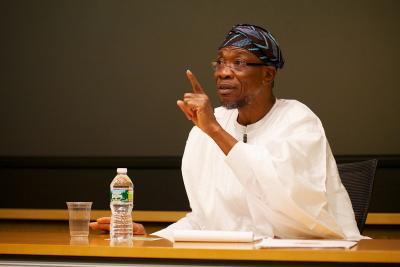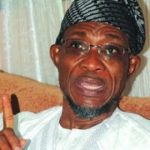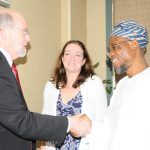
The Osun Example: The State Has Proved That There Is ‘Ability’ In ‘Disability’
 THE last 40 months of Governor Rauf Aregbesola’s administration in Osun State have indisputably been the most eventful in its 19-year history – at least in terms of developmental strides.
THE last 40 months of Governor Rauf Aregbesola’s administration in Osun State have indisputably been the most eventful in its 19-year history – at least in terms of developmental strides.
It is now crystal clear from the Osun example that the economic progress and development of any state are largely functions of the vision, will and ingenuity of the leadership. Osun State used to be rated among the backwaters of the Nigerian economy. The belief was that the state was inherently disadvantaged and thus incapable of making any major economic leap forward.
For one, Osun is 34th of the 36 states in terms of statutory allocation from the Federation Account. Again, the state’s poor economic profile limits the capacity to generate substantial revenue through taxes. Successive administrations had thus confined their vision and ambition within the limits of the paltry federal allocation and an internally generated revenue of approximately N300 million monthly. It is thus not surprising that the Aregbesola administration inherited a state characterised by rising unemployment, gross decay of public infrastructure and unsustainable debt.
However, through the determined and innovative implementation of its Integration Action Plan of banishing poverty, banishing hunger, banishing unemployment, restoring healthy living, promoting functional living and enhancing communal peace and progress, the Aregbesola administration has remarkably turned the Osun story around. For instance, the Osun Youth Employment Scheme (OYES) has created 40,000 jobs and injects N200 million into the local economy monthly. Farmers are being supported to boost food production and enhance food security. The massive road construction undertaken across the state has had a beneficial impact on economic productivity.
In the education sector, ingenious policies have led to the establishment of such enterprises as Omoluabigarments to produce school uniforms on a massive scale and O’meal to provide one meal per day for school children. These ventures generate jobs and stimulate economic activity. Consequently, not only has the state’s internally generated revenue risen to N1.6 billion monthly, Osun State has the lowest poverty index in Nigeria, according to the National Bureau of Statistics (NBS).
Against this background, the administration could easily have assumed it had reached the limits of its performance and thus rest on its oars. The organisation of the recent two-day Osun Economic Summit, however, indicates that the Aregbesola government is determined to raise the benchmark of performance even higher. Tagged ‘OrisunAje’, the theme of the summit was ‘Crux of Osun Economic Developmental Master Plan: Analysing Radical Paradigm Shift’. The summit provided a forum for critical stakeholders in the state – civil society organisations, trade unions, cottage industry owners, community-based organisations and key financial institutions – to appraise the performance of the Aregbesola administration, deliberate on ways of improving current gains as well as identify new potentials and opportunities that could be explored to further uplift the state.
It is noteworthy that the summit was initiated and driven by an Osogbo-based Non-Governmental Organisation, the Peoples Welfare League (PWL), thus giving it the requisite independence to objectively assess the performance of the administration as well as identify its strengths and weaknesses. Equally significant in this respect was Aregbesola’s charge to participants in his opening address not to be patronising of his government but to critically and dispassionately analyse its policies and programmes. It is of course obvious that this is the only way that the summit can be useful in adding value to governance in the state as well as justify the resources committed to it.
We urge the state government to borrow a leaf from Lagos and institutionalise the summit as a critical and objective partner in achieving purpose-driven and qualitative governance. Above all, it must ensure that the summit does not end as a talk shop; its recommendations must not gather dust in government shelves as most other summits, they must be utilised for the development of the state.



